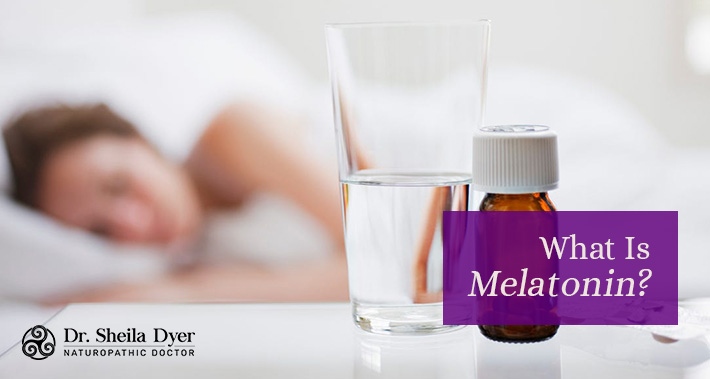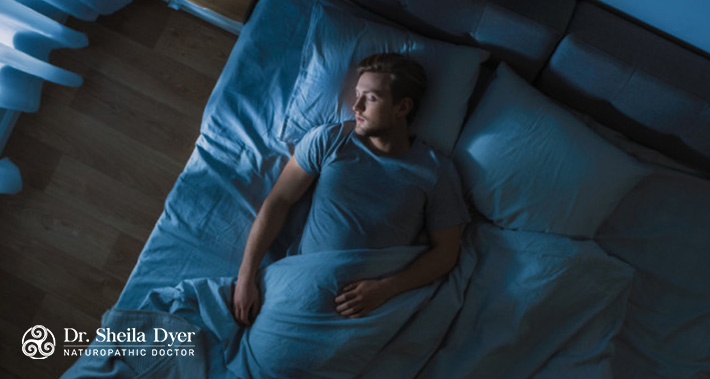The long day you’ve just fought through is done and you’re ready for a good night’s sleep.
So you crawl into bed, close your eyes, and then….nothing.
You’re still wide awake.
You count sheep, toss and turn, or try to think soothing thoughts but you just can’t seem to fall asleep.
Maybe it was the after-dinner coffee you enjoyed or the exciting TV program you watched before bed, but if you can’t fall asleep night after night, there could be something more to it.
There are several factors that can affect your sleep, and as a naturopathic doctor I can help you learn more about natural sleep solutions.
Let’s start by understanding how sleep works.
What Is Your Pineal Gland?
The pineal gland is a small gland located in your brain that is about the size of a pea and is responsible for the production and regulation of hormones including melatonin.
The pineal gland may also have a role in fertility and menstrual cycles due to the fact that it regulates female hormone levels.
What Is Melatonin?
Melatonin is a hormone made by the pineal gland in your body, but you can also find it other areas of including the gut, bone marrow, and eyes.
Melatonin is often called “the sleep hormone” because it lets your body know when it’s night time.
High levels of it can help you to fall asleep faster.
Melatonin is also a powerful antioxidant and may assist in supporting eye health, easing tinnitus, as a treatment for stomach ulcers and heartburn, and even helping to raise the hormone levels of men.
How Does Melatonin Help You Sleep?
Melatonin works with your body’s circadian rhythm (internal clock) to signal to your body when it’s time to go to sleep.
The levels of melatonin you have in your body can affect your sleep quality.
In a survey of Canadians, it was found that those who were able to get the recommended number of hours reported better sleep and feeling more refreshed than those who weren’t.
I know, that’s not exactly shocking.
But here’s the interesting part – 43% of men and 55% of women aged 18-64 reported having trouble going to sleep or staying asleep “sometimes or most of the time.”
So if you’re having trouble sleeping, not only are you not alone, you’re almost in the majority.
Let’s look further into how melatonin can affect your sleep and sleep quality.
1. It Lowers Your Body Temperature
If you’ve ever had to sleep on a hot summer’s night with no air conditioning, you know how difficult it can be to fall asleep when you’re hot.
A study of healthy adults between the ages of 18 and 38 found that ingesting a low dose of melatonin helped their body’s core temperature to drop by 0.05 and 0.15 degrees Celsius after two to three hours.
Subjects who were given a somewhat higher dose (1.0 to 5.0mg) had their core temperature drop by 0.25 and 0.3 degrees Celsius within 30 to 60 minutes.
If we sleep better when our bodies feel slightly cool, it makes sense that melatonin would aid in getting a better night’s sleep.
2. It Lowers Blood Pressure
In a study of men with essential hypertension, taking a single dose of melatonin daily reduced systolic and diastolic blood pressure during sleep by 6 and 4 mmHG, respectively.
A single dose of melatonin had no effect on blood pressure but repeated bedtime doses of melatonin significantly reduced their blood pressure throughout the night.
This is helpful because our blood pressure naturally drops in the evening, so melatonin supplements may help you more naturally mimic your sleep wind-down cycle.
However, this study was done in men who whose high blood pressure was not already being treated with other medication.
So more research in this area needs to be done, but right now it seems to show promise.
However, if you are already taking high blood pressure medication, you should avoid taking melatonin or ask your doctor first as it may cause an adverse interaction.
3. It Reduces Dopamine Levels
Dopamine is a neurotransmitter and hormone that plays a role in pleasure, motivation, and learning.
You may have heard it referred to as the happiness hormone.
While dopamine is an important part of your body’s hormone mix, it’s linked to wakefulness and alertness.
This means that if you have a lot of dopamine at night, you may have trouble falling asleep.
In one study, scientists found that administering dopamine led to a 50% reduction in the dopamine levels of Syrian hamsters after 5 weeks.
While chasing away dopamine isn’t the general goal for most people, taking melatonin in the evening may help to calm your dopamine levels in the evening.
4. It Relieves Pressure Behind Your Eyes
Some studies have shown that regular administration of melatonin also helps to reduce eye pressure.
Because intraocular pressure, or IOP, is linked with stress, relieving that pressure may also help relieve stress, helping you sleep better.
How Can Melatonin Production Be Suppressed?
We’ve all heard about the various routines we should adopt and ways to get a good night’s sleep, but clearly melatonin has a huge effect on our overall sleep health.
So it stands to reason that one of the best things we can do for our sleep is to make sure that our natural melatonin production isn’t being suppressed by some of our bad habits.
Here are some ways that you might be suppressing your body’s production of melatonin without even realizing it.
1. Too Much Light At Night
Melatonin and cortisol are two hormones that are linked to your body’s circadian rhythm.
In the morning, as you’re exposed to light, your cortisol levels start to increase and help you to wake up.
At the same time, your melatonin levels start to decrease.
Both hormones are very sensitive to external sources of light.
If you’re exposed to too much light at night, your body will struggle to produce the amount of melatonin that it needs for a good night’s sleep.
2. Not Enough Light During The Day
If you’ve ever struggled to feel awake during the dark days of winter, you know that light
has a huge effect on your feelings of wakefulness.
In one study subjects who spent their time during the day in a workspace without a window were found to have lower levels of melatonin at 10:00pm and a lower quality of sleep.
Conversely, those who were in a workspace with a window had higher levels of melatonin at 10:00pm leading to a more restful sleep.
3. Cigarette Smoking
There are plenty of reasons to quit smoking but who knew that better sleep could be one of them.
In a study of habitual smokers, researchers found that those who continued smoking had lower levels of melatonin.
Meanwhile, those who took a break from smoking had higher levels of melatonin.
4. Shift Work
Anyone who has done shift work can tell you how much havoc it wreaks on the body.
Having a well-lit work space can help, but it’s not always enough to trick your body into adjusting to a new schedule because our bodies respond more positively to natural sources of light.
A study of nurses doing shift work found that those who were working at night and sleeping during the day had significantly lower levels of melatonin versus those working the day-shift.
Meanwhile, nurses working the night shift did not have peak levels of melatonin during the day even though they were sleeping.
In the end, the study found that night-shift workers produced 33.8% less melatonin than day-shift workers during the 24-hr study period.
Side Effects Of Using Melatonin
Melatonin is a great supplement but it is not without some side effects. Before you take it you should be aware of some of the side effects associated with it. These include:
- Decreased alertness
- Abdominal cramps
- Dizziness
- Temporary depression
- Drowsiness
- Daytime fatigue
- Circadian rhythm disruption
- Headache
- Irritability
- Unease or dissatisfaction (dysphoria) in depressed patients
You should also avoid taking melatonin if you are pregnant or breastfeeding.
Does Melatonin Interact with Other Drugs?
Although melatonin is produced naturally in our bodies, we still have to exercise caution when supplementing it if we are taking other medications.
Serious interactions were found when melatonin was taken with sodium oxybate.
There could also be mild interactions if you are taking any of the following (NOTE: this is not a complete list):
- acebutolol
- atenolol
- betaxolol
- bisoprolol
- carvedilol
- celiprolol
- esmolol
- eucalyptus
- fluvoxamine
- labetalol
- metoprolol
- nadolol
- nebivolol
- penbutolol
- pindolol
- propranolol
- sage
- sotalol
- timolol
Book an Appointment with Dr. Sheila
If you are having trouble getting to sleep, staying asleep, or with your overall quality of sleep, book an appointment with me, Dr. Sheila.
Together we can find a natural solution for your sleep problems.
If you have questions about naturopathic medicine, or would like to start with your first consultation, contact me, and let’s book an appointment.
Dr. Sheila Dyer, ND1080 Dovercourt Rd,
Toronto, ON M6H 2X8
(416) 554-5135
► https://g.page/DrSheilaDyerNd
Dr. Sheila Dyer is a Naturopathic Doctor and a practicing registered nurse offering holistic healthcare with a scientific focus

